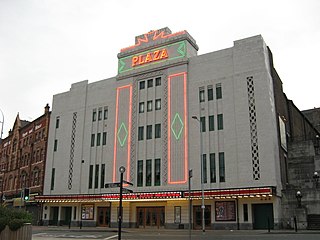J D Wetherspoon is a pub company operating in the United Kingdom and Ireland. The company was founded in 1979 by Tim Martin and is based in Watford. It operates the sub-brand of Lloyds No.1 bars, and 56 Wetherspoon hotels. Wetherspoon is known for converting unconventional premises, such as former cinemas and banks, into pubs. The company is publicly listed on the London Stock Exchange and is a constituent of the FTSE 250 Index.

The London Astoria was a music venue at 157 Charing Cross Road, in London, England, that operated from 1976 to 2009.

The Battersea Arts Centre ("BAC") is a performance space specialising in theatre productions. Located near Clapham Junction railway station in Battersea, in the London Borough of Wandsworth, it was formerly Battersea Town Hall. It is a Grade II* listed building.

The O2 Forum Kentish Town is a concert venue in Kentish Town, London, England, owned by Live Nation Entertainment and originally built in 1934.

The Lyceum is a 1,068-seat theatre in the City of Sheffield, England.

The O2 Academy Bristol is a music venue located on Frogmore Street in Bristol, England. It is run by the Academy Music Group. On 1 January 2009 sponsorship was taken over from Carling by telecommunications company O2 and the venue's name changed from the Carling Academy to the O2 Academy. The academy which hosts club nights and gigs was opened in 2001, and was the third Academy venue in the UK.

The Academy Cinema is a historic building on Cheltenham Road in the Stokes Croft area of Bristol, England. Since its construction in 1914, it has been used for many purposes. It is a Grade II listed building.

The Point is an entertainment complex in Central Milton Keynes, Buckinghamshire, England. When it opened in 1985, it was called the UK's first multiplex cinema although the UK had introduced multi-screen cinemas in 1930 and had been increasing the number of screens in cinemas ever since. The front part of the building has a distinctive mirrored crystal ziggurat shape, framed by external steel beams at each corner, joined at the apex. Originally it had red neon lights connecting the apexes at each side, so that it looked like a pyramid at night.
Green's Playhouse was an entertainment complex comprising a cinema, ballroom, tea rooms and other facilities. The Playhouse was at 126 Renfield Street, Glasgow, Scotland, commissioned by George Green Ltd, designed by the architect John Fairweather, and built by the Cinema Building Company. Opened in 1927, the Playhouse operated until the 1970s, a decline in audience numbers in the 1960s necessitated diversification as a music venue until closure in 1973. The building continued in use as the Apollo, after being acquired by Unicorn Leisure on a lease-holding arrangement, until final closure in 1985, with subsequent demolition in 1987.
In its days as an entertainment centre for London, Harringay in North London also provided more locally directed entertainment in the shape of four cinemas. The earliest was opened in 1910 and was operating as a cinema until January 2003.

The Plaza is a Grade II* listed art deco single-screen cinema and theatre in Stockport, Greater Manchester, England. It opened in 1932, its construction having involved the excavation of the sandstone cliff behind it. After an initial closure in 1966 and a subsequent period in use as a bingo hall by Rank Leiure, it has now been restored as a cinema and theatre, showing films and staging live shows.

The O2 Academy Leeds (formerly known as the Town and Country Club) is a music venue situated in Leeds, West Yorkshire, England. It is run by the Academy Music Group, which has other music venues around the UK. The Academy was nominated for the TPi Awards 2010 for the country's favourite venue.

The Southport Winter Gardens was a Victorian entertainment area located within the town of Southport, Merseyside. The original winter gardens comprised a theatre, opera house, aquarium, a small zoo, conservatory, promenades and halls situated under the grand glass domes.

John Stanley Coombe Beard FRIBA, known professionally as J. Stanley Beard, was an English architect known for designing many cinemas in and around London.
Bradford Odeon is the name applied to two different cinemas in central Bradford, West Yorkshire, England. One, in Godwin Street, was built in 1930 and survives; the other, in Manchester Road, was built in 1938 and demolished in 1969.

The Theatre Royal in Manchester, England, opened in 1845. Situated next to the Free Trade Hall, it is the oldest surviving theatre in Manchester. It was commissioned by Mancunian businessman John Knowles who wanted a theatre venue in the city.
The Theatre Royal, Hanley was a theatre in Stoke-on-Trent, England with a long history.

The Embassy Cinema is a former cinema in the town of Chadwell Heath, Greater London. It was once known, among locals, as The Gaumont. It was designed in an art deco style, with a streamline moderne interior, by Harry Weston in 1934. The building is situated on the border of Redbridge and Barking & Dagenham, in the Chadwell Heath District Centre. The cinema closed in 1966 and became a Bingo Hall. In 2015, following the closure of the Bingo Hall, it was then used as a wedding hall/banqueting suite. The building was listed as an Asset of Community Value by the 'Chadwell Heath South Residents' Association' in August 2017 and is currently the focus of a major cinema restoration project.
The Essoldo Cinema, Beeston is a cinema open from 1938 to 1968 in Beeston, Nottinghamshire, England.














